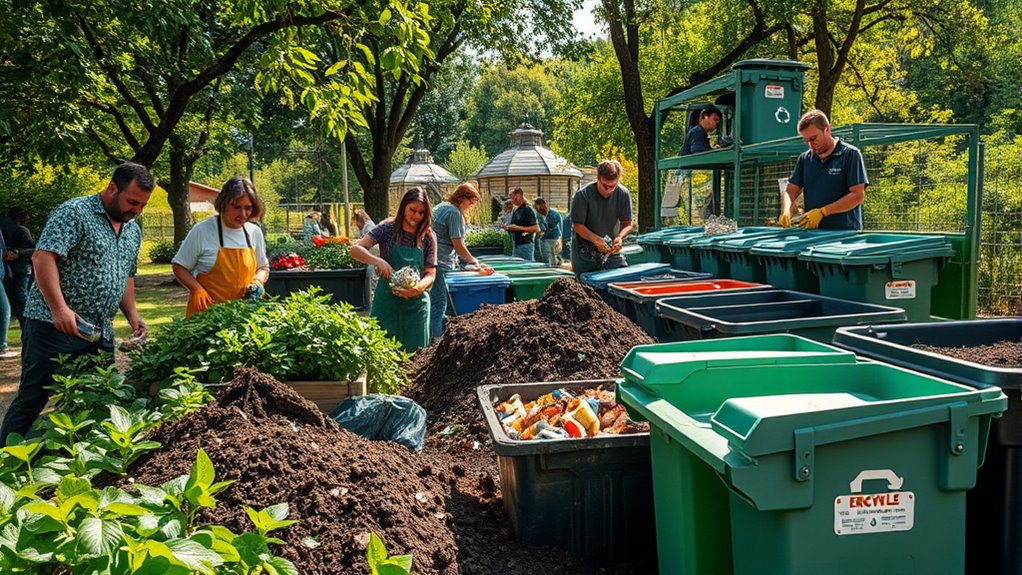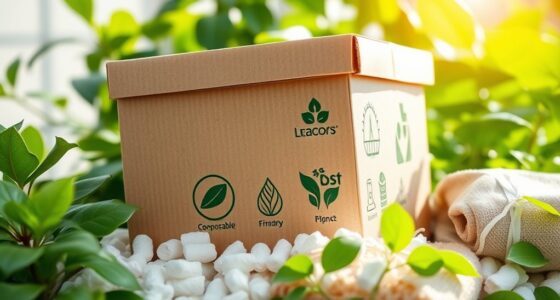To create effective composting and recycling programs, start by encouraging waste segregation at the source with clear labels and educational materials. Engage your community through workshops, social media, and incentives to boost participation. Place accessible collection points and partner with vetted recycling and composting services to guarantee proper processing. Track your progress and celebrate milestones to sustain momentum. If you explore these strategies further, you’ll discover how to turn waste into valuable resources and promote environmental health.
Key Takeaways
- Implement clear waste segregation with labeled bins and educational materials to promote proper disposal practices.
- Engage the community through workshops, social media, and involving local schools and organizations to increase participation.
- Establish accessible collection points with instructions and incentives to encourage consistent recycling and composting efforts.
- Partner with vetted recycling and composting services to ensure proper processing and maximize resource recovery.
- Track program progress, celebrate milestones, and communicate impacts regularly to sustain long-term community involvement.

Implementing effective composting and recycling programs can considerably reduce waste and promote environmental sustainability. One of the first steps you need to take is to emphasize the importance of waste segregation. Proper waste segregation involves separating biodegradable waste from recyclable and non-recyclable materials at the source. When you encourage residents, employees, or community members to sort their waste correctly, you make the entire process more efficient and effective. Clear labeling of bins and providing educational materials can help clarify what goes where, minimizing contamination of recyclable materials and ensuring compostable waste is processed correctly. Waste segregation isn’t just about individual responsibility; it’s about fostering a culture where everyone understands their role in managing waste responsibly. Incorporating vetted recycling and composting options ensures that the materials collected are properly processed and beneficial for the environment.
Community engagement plays a pivotal role in the success of these programs. You need to actively involve the community to build awareness and foster a sense of shared responsibility. Organize workshops, seminars, and outreach events that teach residents about the benefits of composting and recycling. Use social media and local newsletters to share success stories, tips, and updates, keeping everyone informed and motivated. When people see the tangible benefits—such as reduced waste sent to landfills, cleaner neighborhoods, and the creation of nutrient-rich compost—they’re more likely to participate enthusiastically. Engaging the community also means listening to their concerns and feedback, making adjustments to programs as needed to increase participation and effectiveness.
Community involvement boosts composting success through education, shared benefits, and ongoing feedback.
To truly integrate waste segregation and community engagement into your program, consider establishing convenient and accessible collection points. Place clearly marked bins in high-traffic areas, ensuring they’re easy to identify and use. Provide instructions on what materials are accepted, and consider offering incentives for consistent participation, like rewards or recognition events. Collaborate with local schools, businesses, and organizations to expand outreach efforts, turning waste management into a collective effort. When members of the community see their neighbors and local leaders actively involved, it reinforces the importance of their participation.
Finally, tracking the progress of your composting and recycling initiatives helps keep the momentum going. Use data to identify areas for improvement and celebrate milestones reached. Regular communication about the program’s impact can motivate continued community engagement and waste segregation. By making everyone a stakeholder in the process, you’re creating a sustainable system where waste is viewed as a resource rather than a burden. With clear waste segregation practices and strong community involvement, your composting and recycling programs will thrive, making a meaningful contribution to environmental health and sustainability.
Frequently Asked Questions
How Do I Motivate Reluctant Community Members to Participate?
You can motivate reluctant community members by boosting community engagement through clear communication and involving them in decision-making. Use incentive strategies like rewards or recognition to encourage participation. Share success stories and benefits, emphasizing how their efforts positively impact the environment and community. Make participation easy and accessible, and regularly highlight progress. When people see their contribution matters and is appreciated, they’re more likely to get involved actively.
What Are the Environmental Impacts of Composting and Recycling?
Composting and recycling considerably reduce your carbon footprint by cutting down waste that would otherwise go to landfills, where it produces methane. These practices promote waste reduction, conserving natural resources and lowering pollution. By actively participating, you help decrease greenhouse gas emissions and preserve the environment. Your efforts contribute to a healthier planet, demonstrating how small actions can lead to big environmental benefits.
How Can Businesses Integrate These Programs Effectively?
If you want your business to seem eco-friendly and not just talk the talk, get serious about integrating composting and recycling programs. Engage your employees by making waste reduction fun and rewarding. Provide clear guidelines, accessible bins, and regular training. When your team feels involved, they’ll happily reduce waste, compost, and recycle, making your sustainability efforts genuine—and maybe even impressing your eco-conscious customers along the way.
What Are Common Challenges Faced During Program Implementation?
You might face challenges like low community engagement and limited resource allocation, which can slow program implementation. To overcome these, actively promote the benefits to your team and community, making participation appealing. Guarantee you allocate enough resources—time, money, and personnel—so the program runs smoothly. Addressing these issues early helps you build momentum, encouraging ongoing support and sustainable success for your composting and recycling efforts.
How Do I Measure the Success of a Composting or Recycling Initiative?
You measure the success of your composting or recycling initiative by tracking participation metrics, such as the number of participants or collected materials. To gauge waste reduction, compare the amount of waste diverted from landfills over time. Regularly review these data points, set achievable goals, and communicate progress to stakeholders. This approach helps you understand your program’s impact and identify areas for improvement, ensuring continued growth and effectiveness.
Conclusion
By starting a composting and recycling program, you’re planting seeds for a healthier planet. Think of your efforts as a ripple in a pond, spreading change far beyond your immediate surroundings. Every item you compost or recycle transforms waste into a valuable resource, turning your community into a thriving garden of sustainability. Together, your actions can grow into a powerful movement, making the Earth a greener, cleaner place for generations to come.









